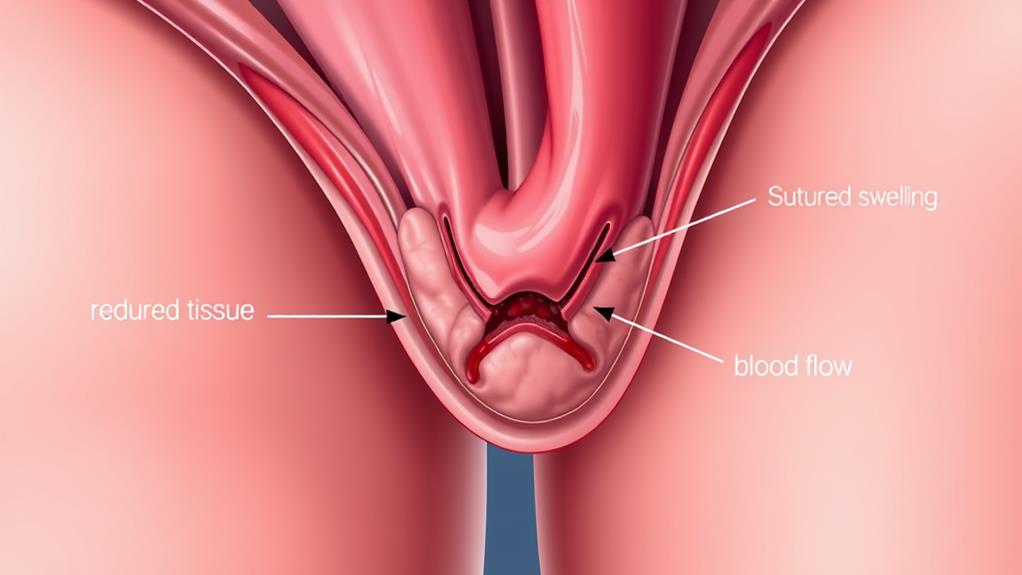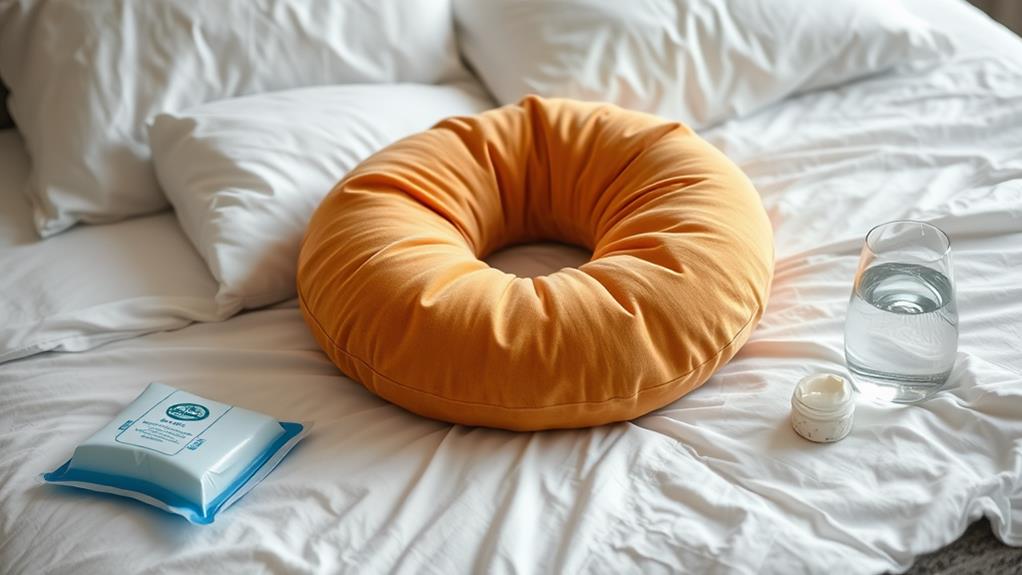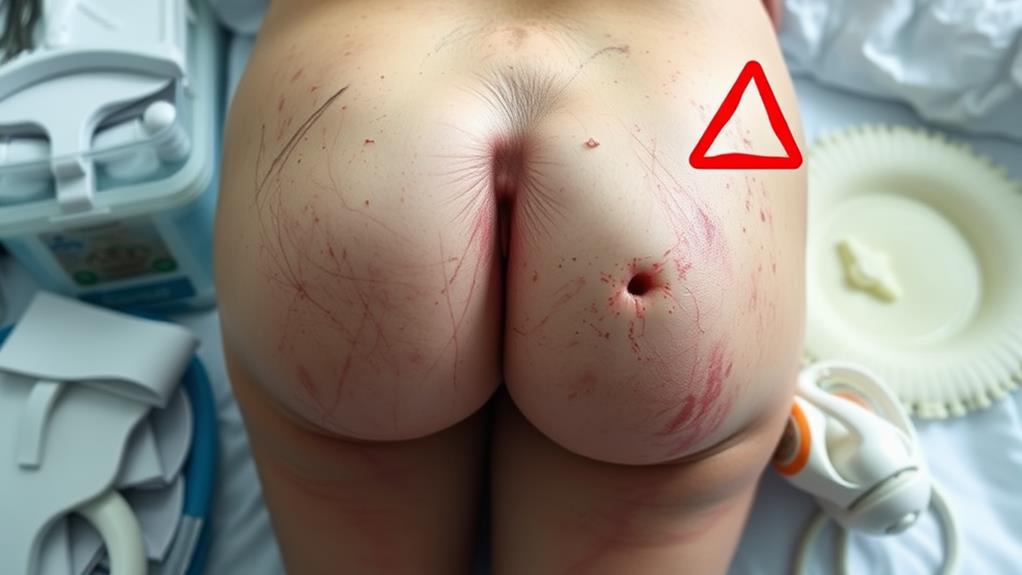As an Amazon Associate I earn from qualifying purchases.
After a hemorrhoidectomy, proper care is vital for ideal recovery. You'll need to manage pain with prescribed medications and ice packs, while keeping the wound clean through sitz baths and gentle cleaning. Follow a high-fiber diet and stay hydrated to prevent constipation. Rest is essential, but gradually increase activity with short walks. Watch for complications like excessive bleeding or severe pain. Attend all follow-up appointments to track your progress. By following your doctor's instructions and maintaining good hygiene, you'll promote healing and reduce the risk of complications. Understanding the details of post-operative care can greatly improve your recovery experience.
Understanding Your Surgical Procedure

Many patients undergoing a hemorrhoidectomy find it helpful to understand the procedure they're about to experience. This surgical procedure removes enlarged blood vessels in your anus, known as hemorrhoids, which can cause uncomfortable symptoms. Hemorrhoidectomy has a 95% success rate in improving quality of life and is typically recommended for complicated cases involving prolapse, thrombosis, strangulation, or recurrence.
Your surgeon will perform the hemorrhoidectomy under anesthesia, using either the closed (Ferguson) or open (Milligan-Morgan) technique. The Ferguson technique is more common in the United States. During the procedure, your surgeon will locate and remove the affected tissue, sealing the blood vessels with a scalpel or electrothermal device. Depending on the location and size of your hemorrhoids, the wounds may be closed or left open.
Understanding your surgical procedure can help you prepare for postoperative recovery. You'll be able to go home the same day, but you'll need someone to drive you and care for you during the initial recovery period. Knowing what to expect can help ease anxiety and promote a smoother healing process.
Immediate Post-Operative Care
After your hemorrhoidectomy, you'll need to focus on managing pain, caring for your wound, and balancing activity with rest. Your doctor will prescribe pain medication, which you should take as directed with food to minimize stomach upset. You'll need to wear sanitary napkins or gauze to keep your underclothing clean, and it's vital to avoid strenuous activities for 1-2 weeks while taking sitz baths and maintaining a healthy diet.
Pain Management Strategies
Managing pain effectively is essential for a smooth recovery after a hemorrhoidectomy. Your doctor will prescribe pain medication to help control post-hemorrhoidectomy pain, and it's imperative to follow their instructions carefully. Always take the medication with food to prevent stomach upset, and never exceed the recommended dose to avoid side effects.
Be aware that pain medication can cause drowsiness, dizziness, and lightheadedness. Nausea and vomiting are also common, especially when you first start taking the medicine. To manage these side effects, take small doses with food. If you experience any issues with pain control, don't hesitate to communicate with your doctor.
In addition to medication, you can employ other strategies for reducing postoperative pain. Apply ice packs to the affected area and take regular warm baths to soothe discomfort. These methods can help lower your pain levels and complement your prescribed pain management plan.
Wound Care Essentials
Proper wound care is a key component of your post-hemorrhoidectomy recovery, working hand-in-hand with pain management to guarantee ideal healing. In the immediate aftermath of your surgery, you'll need to focus on keeping the affected area clean and comfortable. Start by taking warm sitz baths for 10-15 minutes, three to four times daily. This helps reduce pain and promotes healing.
After each bowel movement, gently clean the area with warm water and pat dry. Avoid wiping with toilet paper, as this can irritate the sensitive surgical site. Apply ice packs to the area for short periods to reduce swelling and discomfort. Your doctor may recommend using medicated wipes or creams to further aid healing.
As you approach your first bowel movement post-surgery, don't be alarmed if you experience some bleeding or increased pain. This is normal, but excessive bleeding should be reported to your doctor. Remember, proper care during this critical period can substantially impact your recovery time. Follow your doctor's instructions closely, and don't hesitate to ask questions if you're unsure about any aspect of your wound care routine.
Activity and Rest Balance
How can you balance activity and rest during your immediate post-operative period? After surgery for hemorrhoids, it's vital to avoid strenuous activity for 1-2 weeks to prevent complications and promote healing. During this recovery period, prioritize relaxation and rest, as your body needs time to heal properly.
Take regular breaks throughout the day to avoid fatigue and minimize pain and discomfort. Start with short walks and gradually increase your activity levels over time. This approach allows you to maintain some movement without overexerting yourself. Remember to listen to your body and stop if you experience pain or discomfort.
Avoid heavy lifting, bending, or straining, as these actions can put pressure on the surgical site and impede healing. Instead, focus on gentle movements and maintain proper posture when sitting or standing. As you progress through your postoperative recovery, you'll be able to slowly increase your activity levels.
Always follow your doctor's instructions and attend your follow-up appointment to guarantee proper healing. By striking the right balance between activity and rest, you'll promote a speedy recovery and reduce the risk of complications after your hemorrhoidectomy.
Pain Management Strategies

You'll have several options for managing pain after your hemorrhoidectomy, including both medications and non-pharmacological approaches. It's vital to time your pain relief strategies effectively, especially within the first 72 hours post-surgery when pain levels can be highest. Your doctor will guide you on the best combination of pain management techniques for your specific case, which may include prescribed medications, a pudendal block, and lifestyle adjustments to minimize discomfort.
Medication Options
Managing pain effectively is a pivotal aspect of post-hemorrhoidectomy care. Your doctor will prescribe various medications to help you cope with the discomfort and promote healing. Adequate pain management is essential for a smoother recovery and can markedly impact your overall experience.
You'll likely be given oral pain relievers, such as acetaminophen or nonsteroidal anti-inflammatory drugs (NSAIDs), to address the considerable pain you may experience in the first few days. For more intense discomfort, your doctor might prescribe stronger opioid medications, but these should be used sparingly due to potential side effects and risk of dependence.
Topical anesthetics, such as lidocaine ointments or suppositories, can provide localized relief when applied directly to the affected area. Stool softeners are indispensable in reducing pain during bowel movements and preventing constipation, which can exacerbate discomfort. Your doctor may also recommend fiber supplements to promote softer stools.
It's imperative to follow your medication schedule precisely, taking care not to exceed recommended dosages. If you're experiencing less pain than anticipated, consult your doctor before discontinuing any prescribed medications. They may adjust your treatment plan to guarantee ideal healing and comfort throughout your recovery.
Non-Pharmacological Pain Relief
While medications play a significant role in post-hemorrhoidectomy pain management, several non-pharmacological strategies can complement your recovery. One effective method is applying ice packs to the affected area for 15-20 minutes, 3-4 times daily. This can help reduce pain and swelling, providing relief during your postoperative period.
Warm sitz baths are another vital pain relief technique. By taking these shallow baths 2-3 times a day, you'll experience reduced pain and swelling while promoting healing. For additional comfort, you can apply topical anesthetics like lidocaine or benzocaine to numb the area.
Don't underestimate the power of gentle exercises in your recovery. Kegel exercises and pelvic tilts can improve blood flow and alleviate pain after hemorrhoidectomy. These movements contribute to a smoother healing process and can be easily incorporated into your daily routine.
Lastly, practice relaxation techniques such as deep breathing, meditation, or yoga. These methods can help reduce stress and anxiety, which often exacerbate postoperative pain. By incorporating these non-pharmacological strategies into your recovery plan, you'll enhance your overall comfort and potentially speed up your healing process after hemorrhoidectomy.
Timing Pain Relief Strategies
Effectively timing your pain relief strategies is essential for ideal post-hemorrhoidectomy recovery. Following hemorrhoidectomy, you'll need to manage pain throughout different stages of healing. The first few days are typically the most uncomfortable, so it's imperative to stay ahead of the pain curve.
Start your pain management routine immediately after surgery, following your doctor's instructions. Don't wait for discomfort to become severe before taking prescribed medications. As you progress in your recovery from hemorrhoid surgery, you'll need to adjust your approach:
- Days 1-3: Focus on strict adherence to pain medication schedule
- Days 4-7: Begin incorporating non-pharmacological methods
- Days 8-14: Gradually reduce reliance on pain medications
- Days 15+: Primarily use non-pharmacological techniques as needed
Pay close attention to your body's signals, especially during bowel movements. Time your pain relief strategies to coincide with these potentially uncomfortable moments. Apply ice packs or take prescribed medications about 30 minutes before anticipated bowel movements to minimize discomfort. Remember, proper timing of pain management techniques is pivotal to a smoother recovery and can substantially impact your overall post-surgical care experience.
Wound Care and Hygiene
Proper wound care and hygiene are essential for a smooth recovery after a hemorrhoidectomy. To promote healing and prevent infection, you'll need to keep the wound area clean and dry. After each bowel movement, gently wipe the area with wet Kleenex, cotton, or Tucks pads. This gentle wiping helps maintain cleanliness without irritating the sensitive skin.
Sitz baths play a pivotal role in your recovery. Take them at least three times a day and after each bowel movement. These baths help reduce discomfort, swelling, and itching around the wound area. When drying off, gently pat the area with a clean towel instead of rubbing vigorously.
To further manage pain and swelling, apply ice packs to the affected area for 10-15 minutes, three to four times daily. This can substantially reduce discomfort and promote healing. Additionally, avoid wearing tight clothing, such as underwear or pants, as they can irritate the wound area and slow down your recovery.
Diet and Nutrition Tips

A balanced diet plays a pivotal role in your recovery after a hemorrhoidectomy. Following a high-fiber diet rich in fruits, vegetables, and whole grains can promote regular bowel movements and prevent constipation. Aim to increase your fiber intake to 25-30 grams per day, which will help soften your stool and reduce straining during bowel movements. This promotes healing and reduces the risk of complications.
To support your recovery, focus on these key dietary elements:
- Drink 8-10 glasses of water daily
- Incorporate prune juice into your diet
- Consume omega-3 rich foods like salmon and flaxseeds
- Avoid spicy, fatty, or processed foods
Staying hydrated is vital for keeping your stool soft and preventing constipation. By drinking enough water and avoiding irritating foods, you'll make bowel movements less painful and reduce the risk of hemorrhoid recurrence. Additionally, foods high in omega-3 fatty acids can help reduce inflammation and promote healing after your hemorrhoidectomy. Remember, your diet directly impacts your recovery, so make mindful choices to facilitate optimal healing and comfort during this vital period.
Physical Activity Guidelines
While diet plays a significant role in your recovery, managing physical activity is equally important after a hemorrhoidectomy. During the postoperative period, it is vital to avoid strenuous exercise and heavy lifting for at least 1-2 weeks. This allows your body to heal properly and reduces the risk of complications.
As you recover, gradually increase your physical activity, starting with short walks. This helps alleviate pain and discomfort while promoting healing. However, refrain from driving for 1-2 weeks after surgery, as sitting for extended periods can hinder your recovery.
To prevent hemorrhoid recurrence, avoid activities that involve straining, such as pushing or pulling heavy objects, for 4-6 weeks post-surgery. It is imperative to follow your healthcare provider's specific guidelines, as they may vary depending on your individual case and surgical procedure.
Potential Complications to Watch For

Vigilance is key when recovering from a hemorrhoidectomy, as certain complications may arise. While your surgeon should have discussed potential complications during the informed consent process, it's vital to be aware of signs that may require immediate attention. Hemorrhoid surgery, though generally safe, can occasionally lead to postoperative issues that could affect your quality of life if left untreated.
Be on the lookout for these potential complications and seek medical help if you experience:
- Excessive bleeding or large blood clots
- Severe pain that's uncontrolled by prescribed medications
- High fever (above 101°F or 38.3°C)
- Difficulty urinating or complete inability to urinate
Other complications to watch for include infection, fecal impaction, anal stenosis, or recurrence of hemorrhoids. If you notice persistent swelling, discharge, or a foul odor from the surgical site, don't hesitate to contact your doctor. Remember, early intervention can prevent minor issues from becoming major problems. By staying alert and communicating with your healthcare provider, you'll guarantee the best possible outcome from your hemorrhoidectomy and a smoother recovery process.
Follow-Up Appointments and Recovery Milestones
Following your hemorrhoidectomy, you'll need to attend several follow-up appointments to guarantee proper healing and address any concerns. Your first appointment is typically scheduled three weeks after surgery, allowing your healthcare provider to assess your progress and manage any complications.
During these visits, your doctor will check for signs of infection, bleeding, or other issues while providing guidance on pain management and wound care. It's vital to attend all scheduled appointments to facilitate a swift recovery and promptly address potential problems.
Follow-up visits also offer an opportunity to discuss changes in bowel habits, pain levels, or other symptoms, enabling your doctor to provide tailored advice for your postoperative care.
| Recovery Milestone | Timeframe | Description |
|---|---|---|
| Pain Relief | 2 weeks | Significant reduction in discomfort |
| Normal Activities | 2-4 weeks | Gradual return to daily routines |
| Wound Healing | 6-8 weeks | Complete closure of surgical site |
| Final Follow-up | 8-12 weeks | Assess overall recovery and results |
Frequently Asked Questions
What Is Postoperative Care After Hemorrhoid Surgery?
After hemorrhoid surgery, you'll manage pain, keep the surgical site clean, and follow dietary changes. Focus on wound healing, adjust activity levels, and adhere to medication. Take sitz baths, stay hydrated, and attend follow-up appointments for ideal recovery.
What Are the Nursing Interventions After Hemorrhoidectomy?
Imagine pain relief and wound care dancing together. You'll assess the wound, manage pain, and administer meds. Encourage mobility, guide diet choices, and monitor fluids. These interventions will help you recover smoothly after your hemorrhoidectomy.
What Is the Best Recovery for a Hemorrhoidectomy?
For the best recovery after a hemorrhoidectomy, you'll need to focus on pain management, proper wound care, and taking sitz baths. Make dietary changes, get plenty of rest, and stick to your medication schedule. Follow your doctor's instructions closely.
What Are the Patient Education for Hemorrhoidectomy?
You'll learn about hemorrhoid risks, surgical anxiety, and wound complications. Expect pain and changes in bowel habits. Follow medication instructions carefully. We'll discuss how to manage discomfort, prevent issues, and guarantee proper healing after your hemorrhoidectomy.
Conclusion
You've set out on a journey to heal, and like any voyage, it requires patience and care. By following these post-hemorrhoidectomy guidelines, you're setting sail for a smooth recovery. Remember, your body's a ship that needs proper maintenance. Stay vigilant with pain management, wound care, and follow-up appointments. As you navigate through potential complications, you'll reach milestones that mark your progress. Soon, you'll dock at the harbor of full recovery, ready to enjoy life without hemorrhoid discomfort.
Amazon and the Amazon logo are trademarks of Amazon.com, Inc, or its affiliates.
